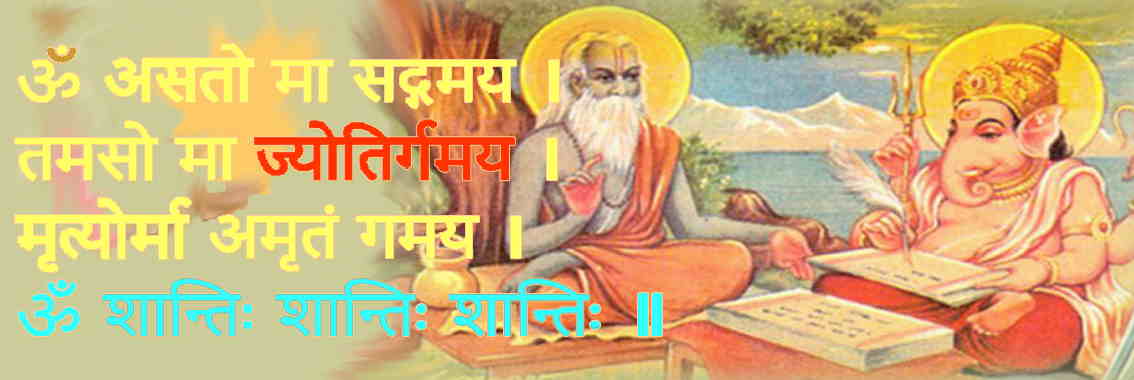Titiksha – Endurance
व्यां वेदव्यासाय नमः
vyāṁ vedavyāsāya namaḥ
Guru Purnima is the occasion to express gratitude to our mentors, teachers and Gurus who are illumining our path. I am reminded of this verse in the Advaita text Viveka Chudamani of Adi Shankara that I am now studying with my Vedanta teacher.
दुर्लभं त्रयमेवैतद्देवानुग्रहहेतुकम् |
मनुष्यत्वं मुमुक्षुत्वं महापुरुषसंश्रयः||
durlabhaṃ trayamevaitaddevānugrahahetukam |
manuṣyatvaṃ mumukṣutvaṃ mahāpuruṣasaṃśrayaḥ ||
There are three things which are rare indeed and are due to the grace of God – a human birth, the longing for liberation, and the discipleship to an illumined teacher or a spiritual guide.
Last year, on this same occasion I wrote about how one should approach a chosen spiritual guide and what one should offer the person and the qualifications one should possess to facilitate learning. These are called the “Sadhana Chatushtaya” or the four-fold qualification that is given in Tattva Bodha. https://vijayajyoti.com/guru-purnima/. Being aware of these requirements is a preliminary step in the path of spiritual progress. The more qualifications we gain, the better will be the assimilation of knowledge. When there is a conflict in theory and practice, then one must re-visit these qualifications to see what is being not followed. On this special day of Guru Purnima I want to explore Titiksha or endurance as a quality I want to consciously develop further.
Titiksha is endurance or tolerance or the acceptance of life without grudge or a sense of failure. There are both pleasurable and painful events in life and the resistance to painful events is high. By using free will we can prevent painful problems, and many difficulties are reduced by remedies. However, we still encounter some prabala prarabdha karma which is neither preventable nor redeemable, this we are forced to endure. We experience many situations where we are helpless, and we feel targeted. Sometimes the problem is too close to us or cannot be down away with. This also includes the tolerance for other’s reaction arising out of their insecurities to which we are subject to. We have to develop the ability to show forbearance in disapproval and disappointments. My favourite quote here is “This too shall pass”. Greater the strength in endurance, lower is generation of violent reactions and toxic emotions such as anger, grief and depression. Toxic emotions are generated by a mind that does not have endurance. Shankara, in the same text in verse 24 says that endurance is present only when there is no redressal while sticking to the goal, in not dwelling on the problem constantly (making your mind unavailable) and in not lamenting (talking to others about it).
What is the advantage of endurance?
We need considerable inner strength to meet the challenges in life with patience. Stress happens when the mind is unable to accept the situation as it is. We want a different outcome, hence lose our balance and the sight of our goal or creativity. No athlete has won medals without considerable endurance. The practice of it helps us in realising our goals. We can free ourselves from being held hostage to the past impressions that hijack our thinking by making us react without further thought. With endurance we change our cognitive thinking and behaviour and hence, new outcomes are possible while breaking the shackles of existing thought. Endurance also stops us from sprouting the negative emotions into actual diseases.
How does one increase endurance?
Tapas or austerity is one of the methods of increasing endurance. Chapter 16 of Bhagavad Gita enumerates tapas as a quality that one should develop for improving spiritual strength. Chapter 17 of Bhagavad Gita illustrates tapas or austerity at three levels – of the body, of the speech and the mind. The Yoga Sutras of Patanjali also talk about tapas being one of the key components of the practice of yoga or one-pointedness. Body level tapas involves worshipping the Gods, the learned and the wise by maintaining cleanliness, simplicity, celibacy and non-violence. Fasting on auspicious days and eating modest and calming foods helps. The second level of tapas is that of speech. We must remember not to utter words that cause distress and that are always truthful and beneficial. The best form of speech is the recitation of mantra or scriptures. To control speech one should keep silence or “mauna vrata”. Finally, the highest tapas is of the mind in the form of serenity of thought, gentleness, silence, self-control, and purity of purpose.
For everything is in the mind and once we gain control of our mind, the infinite is possible. Lord Krishna, in Chapter 6, verse 5 of Bhagavad Gita says that mind is our greatest friend and the worst enemy.
उद्धरेदात्मनात्मानं नात्मानमवसादयेत् |
आत्मैव ह्यात्मनो बन्धुरात्मैव रिपुरात्मन: ||
uddhared ātmanātmānaṁ nātmānam avasādayet
ātmaiva hyātmano bandhur ātmaiva ripur ātmanaḥ
Let a man lift himself by his own Self alone, and let him not lower himself, for this Self, alone is the friend of oneself, and this self alone is the enemy of oneself
श्री कृष्णार्पणमस्तु
śrī Kṛṣṇārpaṇamastu
Reference – The article is based on the teachings of my Vedanta guru Swami Paramarthananda of Arsha Vidaya Gurukulam on Viveka Chudamani, Tattva Bodha and Bhagavata Gita

